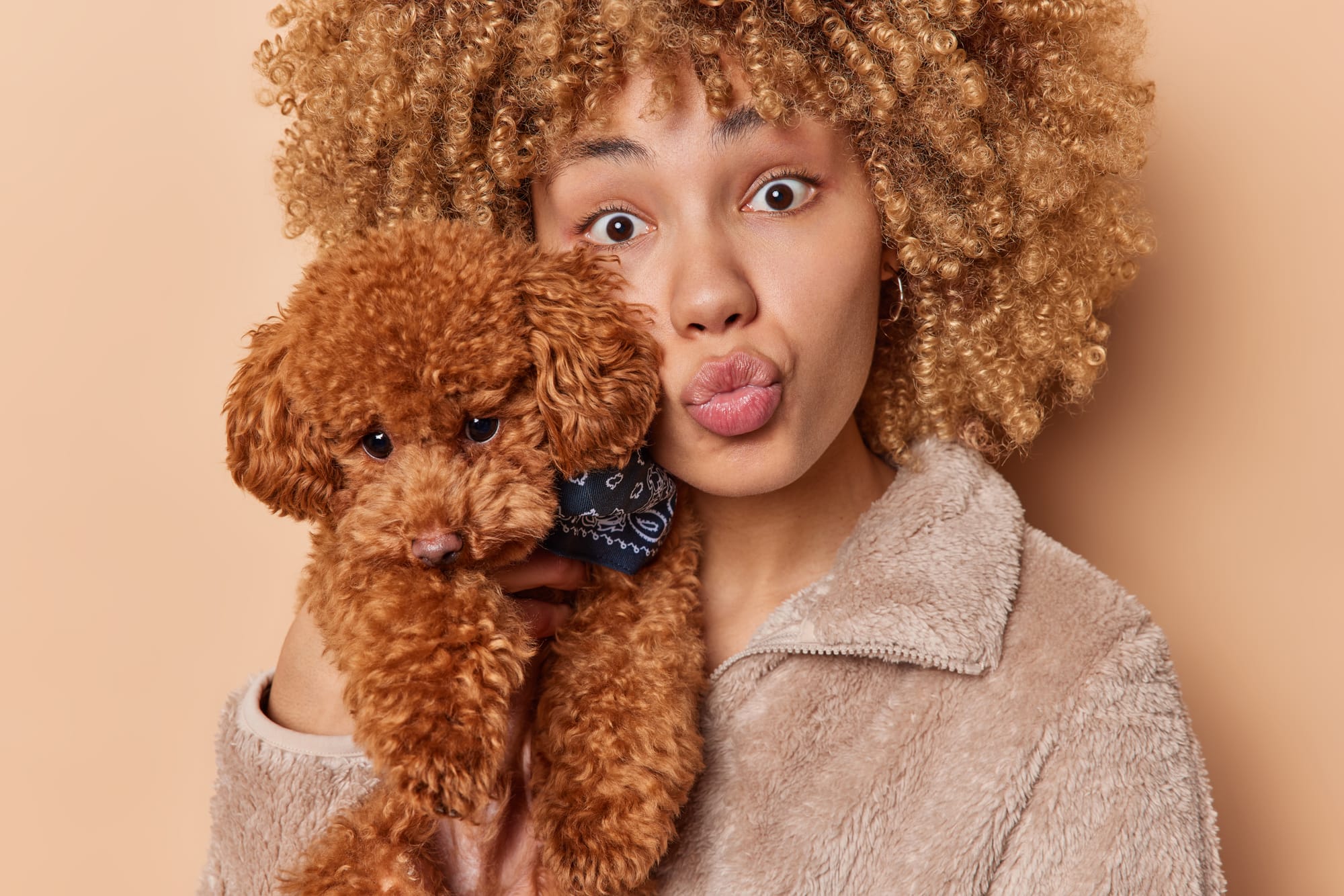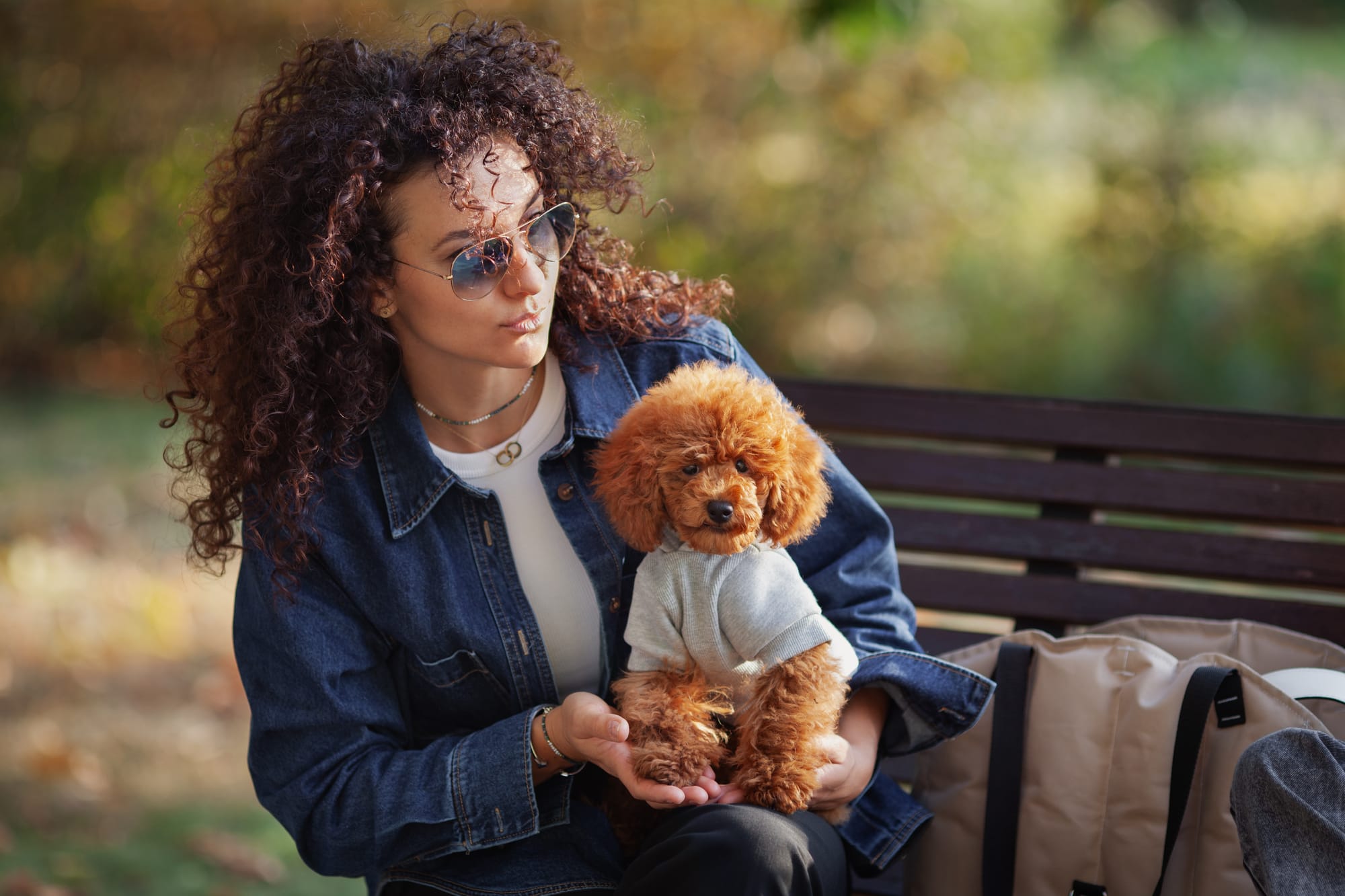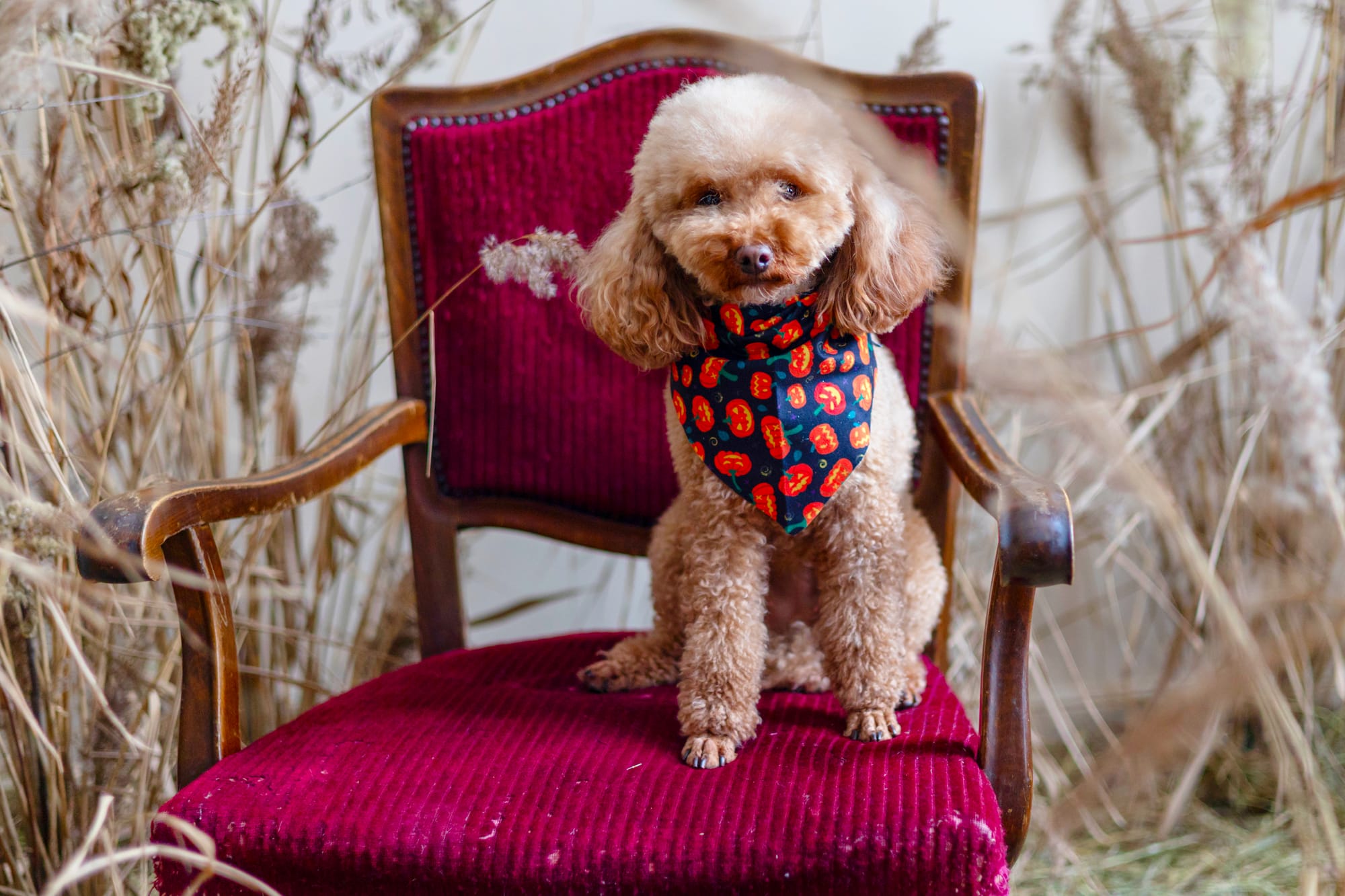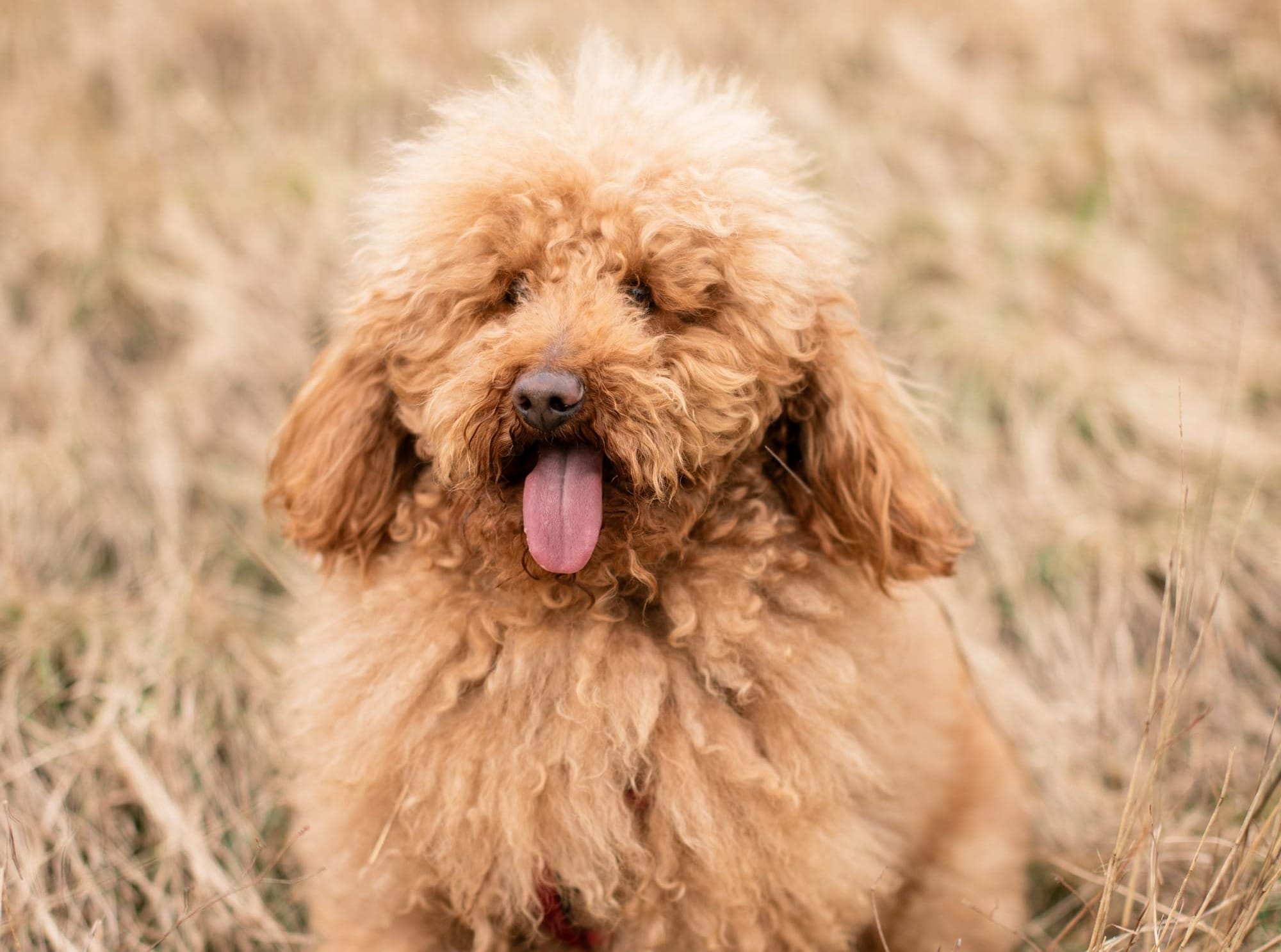Exploring the idea of owning a Toy Poodle or looking for ways to enhance your current fur-friend’s life? These compact and clever canines are perfect for cozy living spaces and bring a unique set of needs, especially their signature curly coat care. Our concise guide walks you through the essentials of Toy Poodle care, health, and happiness, ensuring a fulfilling relationship with your tiny companion.

Key Takeaways
- Toy Poodles are highly sociable, intelligent, and adaptable, making them ideal companions for apartment living and for families, with a need for regular grooming to maintain their hypoallergenic coats.
- Training Toy Poodles involves positive reinforcement and should start from a young age, promoting their natural intelligence and eagerness to learn, which aids in their high responsiveness to training.
- Toy Poodles require a balanced diet tailored to their size and activity level, proper health care to mitigate breed-specific health issues, and regular grooming, which contributes significantly to their overall health and longevity.
Discovering the Toy Poodle: A Compact Companion
A Toy Poodle is more than just a petite and pretty face. Famed for their intelligence and athleticism, these tiny companions are never short of surprises. Their slender muzzle, long neck, and distinctively styled curly coat contribute to their elegant appearance.
Beyond their looks, their lively and sociable nature makes them an affectionate and entertaining addition to any family. Embodying a companionable demeanor, Toy Poodles are known to develop deep bonds with their family, becoming close and trusted friends.
The Toy Poodle's Size and Charm
Standing no taller than 10 inches at the shoulder and weighing between 4–6 pounds, the Toy Poodle is a true compact delight. Their small stature makes them well-suited for apartment living, and they have the ability to adapt seamlessly to smaller living spaces. A toy poodle puppy can be a perfect addition to your family, fitting right into your cozy home.
This compact size not only makes Toy Poodles ideal for apartment dwellers but also serves as an advantage for people seeking travel-friendly pets.
The Allure of a Curly Coat
There’s something truly enchanting about the Toy Poodle’s curly coat. Despite its hypoallergenic properties, the unique curls require frequent grooming to prevent tangles and matting, which goes beyond maintaining their beauty and contributes to their overall health.
The Joy of Owning a Toy Poodle
Toy Poodles bring joy to their toy poodle owner in more ways than one. Their deep sense of companionship and affectionate nature can significantly reduce feelings of loneliness. Thanks to their small size and adaptability, Toy Poodles are easy to integrate into various family routines and living environments.
Lastly, their sociability and non-aggressive nature makes them great watch dogs, alerting their owners to visitors, especially when it comes to hunting dogs.

Mental Stimulation and Playtime
Mental stimulation is a crucial part of a Toy Poodle’s life, preventing destructive behaviors that stem from boredom. Playtime can be enriched with interactive games, fetch, or even setting up mini agility courses, providing both mental and physical stimulation.
Furthermore, engagement in interactive play can increase bonding and help mitigate issues like separation anxiety.
The Bond with Small Children
Toy Poodles are known for their tolerance and patience with children, which can contribute to nurturing family-friendly dynamics. However, due to their small size, it is important to supervise interactions between Toy Poodles and children to prevent accidental injuries.
Early socialization helps Toy Poodles become playful, self-confident, and well-tempered family members, enjoying activities and exercise with children.
Mastering Toy Poodle Training
Toy Poodles are known for their high intelligence and eagerness to please, making them highly trainable and responsive in training situations. Their intellectual capacity makes teaching new tricks and commands a rewarding experience that provides essential mental stimulation.
Consistent rules and clear communication are crucial for establishing effective owner-pet understanding.
Starting at a Young Age
Starting training at a young age taps into Toy Poodles’ natural desire to please their owners and their capacity for swift learning, allowing them to grasp basic commands like ‘sit’, ‘stay’, and ‘come’ early on. Enrolling in dog training classes and regular visits to dog parks for socialization allows Toy Poodles to interact with other dogs, promoting not only healthy social behavior but also essential exercise.
Positive Reinforcement Techniques
Positive reinforcement training encourages Toy Poodles to repeat desired behaviors by immediately rewarding them upon displaying the behavior, with correct timing and consistency being crucial for effectiveness. Variety in rewards, such as food treats, praise, or access to a favorite toy, can effectively motivate Toy Poodles.
Furthermore, shaping behaviors incrementally and clicker training are two techniques within positive reinforcement that can be particularly effective in training Toy Poodles to perform complex tasks.

Health and Longevity of Toy Poodles
Toy Poodles are generally considered a healthy breed with a life expectancy of up to 18 years. However, like any breed, they may face health issues such as:
- Skin tumors
- Bladder stones
- Tracheal collapse
- Cushing’s Disease
But don’t fret, early detection and regular veterinary care can help manage and treat these health problems.
Life Expectancy and Preventive Care
Toy Poodles have an impressive lifespan ranging from 10 to 18 years, indicating a potential for a long and healthy life with proper care. Routine preventive care, like dental cleanings, is crucial to prevent common small breed issues such as dental disease, thereby potentially extending a Toy Poodle’s lifespan.
Recognizing Signs of Health Concerns
Early signs of Progressive Retinal Atrophy (PRA) in Toy Poodles are night blindness, where dogs may show reluctance to enter dark rooms or bump into objects in poorly lit areas. As PRA in Toy Poodles advances, noticeable signs include dilated pupils that do not respond to light, indicating worsening vision loss.
Regular eye exams and early detection can help manage this condition and prevent total blindness.
Nutrition for Your Toy Poodle
When selecting dog food for Toy Poodles, it is important to consider their size and activity level to ensure a balanced nutritional intake. Whether they’re puppies or adults, consulting with a veterinarian can help determine the right food and appropriate portion control to maintain their optimal weight and prevent overfeeding.
Wet Food vs. Dry Food
When it comes to feeding your Toy Poodle, both wet and dry food have their pros and cons. Wet food, with its enhanced texture and scent, is typically more appealing to Toy Poodles and its high moisture content can help those with insufficient water intake.
On the other hand, dry food provides a nutritious diet while also promoting dental health through its crunchy texture.
Portion Sizes and Feeding Schedule
Toy Poodles have unique feeding requirements. Here are some guidelines to follow:
- Toy Poodle puppies should be fed three to four small meals per day.
- Adult Toy Poodles can be fed two to three meals per day to maintain blood sugar levels and support their metabolism.
- Portion sizes should be derived from their daily caloric needs, taking into account the dog’s weight and activity level.
Treats should also be moderated to prevent weight gain and nutritional imbalances.

Grooming Your Toy Poodle: More Than Just Looks
Regular grooming is more than maintaining the distinctive curly coat of a Toy Poodle, it is essential for their overall health. Toy Poodles require daily or every other day brushing to prevent their coats from getting matted and to make grooming easier overall.
Professional Groomer or DIY?
While many Toy Poodle owners choose professional groomers due to the convenience and high-quality results they provide, DIY grooming is a viable option for those who are ready to invest time to learn essential skills like brushing, bathing, and clipping.
Nail Trim and Ear Care
In addition to coat care, regular cleaning of a Poodle’s ears is necessary to prevent infections, particularly for those breeds with long and floppy ears. Trimming their nails regularly is also crucial to prevent overgrowth that can lead to discomfort and health issues.
Finding a Reputable Breeder or Rescue
Finding a reputable breeder or rescue for adopting a Toy Poodle involves thorough research, certifications, and transparency about health concerns. Reputable breeders should provide detailed health information for their puppies and be transparent about any health concerns.
The American Kennel Club and Poodle Clubs
The American Kennel Club (AKC) provides a marketplace for breeders to list their AKC-registered sires, dams, and litters, granting puppies from these litters eligibility for AKC registration. However, it’s essential to note that while breeders are listed on the AKC Marketplace, the AKC does not officially license or endorse any breeders, and all transactions occur directly between the buyer and the breeder.

Adoption as an Option
Adopting a Toy Poodle can:
- Save a life
- Give the dog a second chance at happiness in a loving home
- Provide a strong ability to adapt to new homes
- Overcome misconceptions about shelter pets
Many toy poodles, a popular dog breed, in shelters have these qualities, but most toy poodles are often overlooked among other dog breeds due to the prevalence of puppy mills.
Older Poodles may be less demanding than puppies, making them suitable for those seeking a less energy-intensive pet.
Comparing Poodle Varieties
When it comes to Poodles, one size does not fit all. From the smallest Toy to the largest Standard, each Poodle variety has its unique qualities. While all Poodles share a baseline of friendly and loving characteristics, each size has unique temperament traits.
From Toy to Standard: A Size Comparison
Standard Poodles are the largest, ranging from 50–70 pounds in weight and 18–24 inches in height, making them more suited for active individuals or families with more spacious living areas like homes with yards.
On the other hand, Miniature Poodles are medium-sized, standing 10–15 inches tall and weighing about 10–15 pounds, making them adaptable to various living environments including smaller, urban apartments.
Personality Traits Across Poodle Breeds
The personality traits of Poodles vary across the breeds. Toy Poodles, while retaining the alertness and energy levels of their larger counterparts, tend to have a quieter and more subdued temperament, making them ideal for those desiring a gentle companion.
On the other hand, Standard Poodles showcase a highly energetic and intelligent demeanor, aligning well with owners interested in outdoor activities and who can provide adequate space for exercise.
Summary
In this journey of discovery, we’ve unraveled the many endearing qualities that make Toy Poodles such a popular breed. From their compact size and hypoallergenic coat to their intelligence, sociability, and longevity, the Toy Poodle presents a blend of charm and intellect that’s hard to resist. Whether you’re a first-time owner or a seasoned dog lover, this breed’s versatility and adaptability make it a delightful addition to any family.
Frequently Asked Questions (FAQs)
- Do poodles shed?
- Yes, poodles do shed, but they shed lightly due to their curly coat, which helps in retaining the fur. This makes them a good option for dog lovers who suffer from allergies.
- Are Toy Poodles high maintenance?
- Yes, toy poodles are considered high maintenance because of their frequent and potentially expensive grooming needs, such as clipping their hair, as they do not shed. It's a significant factor to consider before getting one as a pet.
- Do Toy Poodles bark a lot?
- While toy poodles are capable of barking a lot, consistent training and ample stimulation can help manage and reduce excessive barking. Keep in mind that not every toy poodle will be overly noisy.
- Are Toy Poodles a good pet?
- Toy Poodles are devoted family pets that are exceptionally intelligent, easy to train, and have lower exercise needs, making them great companions for all family members. Their smaller size makes them better suited for older children and quiet households.
- How tall does a Toy Poodle grow?
- A Toy Poodle typically grows to a height of no more than 10 inches at the shoulder, making them one of the smallest dog breeds.




